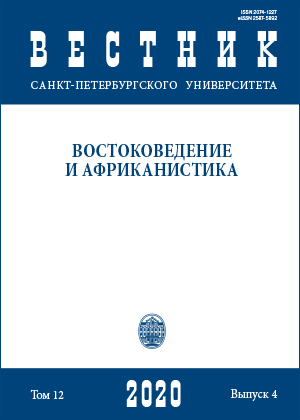The Features of the Domestic Political Development of Mauritania during the Reign of Mohammed Ould Abdel Aziz (2009–2019)
DOI:
https://doi.org/10.21638/spbu13.2020.410Abstract
This article is devoted to the study of domestic political development of Mauritania during the ten years President Mohammed Ould Abdel Aziz’s reign (2009–2019). The author focuses on the main challenges to the regime supported by the military junta, as well as on the key reasons for its preservation, despite the presence of sharp contradictions within the state. The army, entrenched in power structures, had to face such problems as terrorism from Al-Qaeda, the Arab spring, and the assassination attempt on the president. At the same time, the country’s authorities were able to address these problems through a tough fight against extremism. One cannot fail to note the introduction of the practice of expanding the circle of parties loyal to the president and the national dialogue with the opposition, which not only contributed to the legitimization of Abdel Aziz’s personality, but also continued his political activity. This occurred while most regimes in the Arab East either fell or were faced with lengthy civil wars. In addition, the author notes that the elections and referendum, as elements of democracy, have been used more than once by Abdel Aziz to advance his interests, despite protests and criticism from opposition parties. In fact, in 2017, the country’s leadership was able to rewrite the constitution for itself and subjugate the legislative and judicial branches of the government. It is worth stating that Abdel Aziz became the first head of state who, in the entire modern history of Mauritania, was able to ensure a peaceful transfer of power after the end of the second presidential term. This decision did not force citizens to experience another coup d’état and political instability. In general, the author comes to the conclusion that the rule of Abdel Aziz had two main features: the desire to retain all the levers of power and, if political instability is brewing, to initiate negotiations with the opposition. These contradictions were not resolved, and the pendulum constantly swung depending on the domestic political background in the country.
Keywords:
Mauritania, Nouakchott, Mohammed Ould Abdel Aziz, Union for the Republic, Tawassul, Muslim Brotherhood
Downloads
References
Downloads
Published
How to Cite
Issue
Section
License
Articles of "Vestnik of Saint Petersburg University. Asian and African Studies" are open access distributed under the terms of the License Agreement with Saint Petersburg State University, which permits to the authors unrestricted distribution and self-archiving free of charge.





